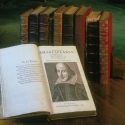Proposed Google settlement could propel UW book digitization efforts
A landmark proposed settlement announced today between Google and national author and publisher organizations could bring significant enhancements to the University of Wisconsin–Madison’s digitization partnership with the information technology company.
UW-Madison is completing the second full year of its agreement with Google and to date has digitized about 150,000 works from UW-Madison Libraries and the Wisconsin Historical Society. UW–Madison has been an active contributor to the Google Book Project.
“This proposed settlement, if approved, will have major implications for both the creators and consumers of books,” says Edward Van Gemert, associate director of University Libraries. “The development of a commercial market for millions of in-copyright books that are currently out of print or unavailable would be an attractive development for authors, publishers and readers.”
More specifically to universities, the settlement creates a model for institutional subscriptions that will provide broad access to in-copyright material for academic institutions, Van Gemert says. And in keeping with the original goals of the project, it will greatly expand the amount of public domain material that is accessible to all.
“These elements of the settlement should ultimately prove beneficial to the UW–Madison community and we intend to continue making our collections available for this project,” Van Gemert says.
UW-Madison’s digitization focus has been on public domain materials from the late 19th century and early 20th century, including state and federal government documents from a variety of locations. The university also digitized the entire collection of genealogical materials for the Wisconsin Historical Society (WHS). Van Gemert says this is a very important and widely used collection that is now searchable online, eliminating the need for users to travel to Madison for access.
A second focus area has been the Historical Society’s Native American collection, which has about 8,300 items covering all tribes in North America, including Canada. About 30 percent of this collection has been sent to Google for digitization. Another collection valuable to public schools has been the Historical Society’s 6,300-item African-American collection.
These unique collections were chosen because they are used heavily by schools throughout the state, and their online availability should spur even greater usage, Van Gemert says. He adds that the university has already seen a spike in usage of the materials on Google’s online public access catalog.
Other digitized collections from Wisconsin include:
- The “Cutter” collection from the Kohler Art Library, which includes more than 200,000 titles of American and European history;
- The labor history collection from WHS;
- Wisconsin State government documents from WHS and from Steenbock Libraries;
- The patent collection from Wendt Engineering Library.
“We are fulfilling our ambition of making vast amounts of public domain content freely available to everyone,” says University Libraries Director Kenneth Frazier. “The ability to serve the people of Wisconsin and the academic community at large has risen considerably through this effort.”
Subscribe to Wisconsin Ideas
Want more stories of the Wisconsin Idea in action? Sign-up for our monthly e-newsletter highlighting how Badgers are taking their education and research beyond the boundaries of the classroom to improve lives.
Tags: arts, libraries, The Wisconsin Idea


